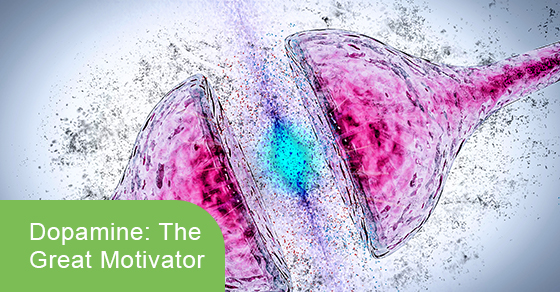Doing something unenjoyable is challenging for anyone. Many of us put off initiating projects that are boring, time-consuming, repetitive, or require a lot of effort but offer little reward.
For people managing deficits in executive function and attention, it can seem next to impossible to begin and complete these kinds of tasks, and they often rely on the adrenaline rush that comes with the panic of a last-minute deadline to give them the push they need to get started. If this sounds like you, take heart. Procrastination is not a character flaw, a sign of laziness, a lack of willpower, or evidence of low intelligence. Research is revealing that the source of our motivation may be connected to dopamine pathways in the brain and that the disruption of those pathways may be particularly acute for people with ADHD (Volkow et al).
If it feels good, you do it!
Dopamine is a hormone and neurotransmitter (chemical messenger) produced in the brain that plays a strong role in attention and focus. It is part of the brain’s reward system, generating feelings of pleasure during activities that are essential to our survival, such as eating or drinking.
When you’re doing something enjoyable, your brain releases a surge of dopamine, which reinforces that behaviour, and makes you want to repeat it. Not surprisingly, that can sometimes lead to unhealthy addictions. Dopamine also plays a role in movement, arousal, sleep, executive function, memory, mood, and learning. When the number of dopamine receptors in the brain is lower than normal or if the brain does not produce enough dopamine, many of these processes can be disrupted.
A built-in lack of motivation
Early research published in the journal Molecular Psychiatry showed decreased function in the brain dopamine reward pathway in adults with ADHD which may underlie motivational deficits for people with the condition. The findings provide evidence that disruption of the pathway may contribute to attention deficits and support the use of therapeutic interventions to enhance motivation in ADHD. The researchers conclude that “our findings and those from other studies reporting motivational deficits in ADHD strongly suggest that ADHD is a disorder not only of attention-deficit and hyperactivity/impulsivity but also of motivation-deficit, that appears to reflect an hypofunctional DA reward pathway” (Volkow et al.).
This possible dysfunction in reward and motivation may also explain why people with ADHD can focus on intrinsically interesting activities consistently and for long periods of time, but have trouble delaying gratification, prefer small immediate rewards over long-term rewards, and require strong incentives to modify their behaviour.
The authors of the Molecular Psychiatry study concluded that “decreased activity of the reward system in individuals with ADHD is likely to translate into problems in engaging in activities that are not inherently rewarding or reinforcing (and therefore may be described as less interesting or less motivating). By extrapolation to children, our observations in adults with ADHD could explain the reports of some parents that their child with ADHD can spend hours playing video games, but cannot focus attention on tasks at school, and the reports of children with ADHD that schoolwork is ‘boring,’ which is commonly used to explain their lack of effort” (Volkow et al.).
Weak working memory can make it even harder
In his book Outside the Box: Rethinking ADD/ADHD in Children and Adults, noted ADHD expert Thomas Brown also observes that “despite the many differences among children and adults with attention deficit disorder (ADHD or ADD), there is one similarity shared by virtually all of them. Although they have considerable chronic difficulty in getting organized and getting started on many tasks, focusing their attention, sustaining their efforts, and utilizing their short-term working memory, all of those diagnosed with ADHD tend to have at least a few specific activities or tasks for which they have no difficulty in exercising these very same functions in a normal or an extraordinary way.”
Brown says that “the most basic factor contributing to the ability of persons with ADHD to focus very well and efficiently utilize their executive functions on some tasks, while being chronically unable to focus adequately on most other tasks, is a problem of neural transmission. For many years, it has been recognized that individuals with ADHD tend to chronically have insufficient release and reloading of the neurotransmitter dopamine at synaptic junctions of neurons in the networks that manage executive functions.” He notes that working memory is also critical to people’s ability to pay attention to some tasks and not others, and people with a weak working memory have trouble keeping relative priorities top of mind throughout the day.
Parents and teachers can work together to capitalize on a student’s talents and successes and incorporate activities and settings that they find rewarding. Other strategies are also helpful in managing motivation and overcoming deficits in working memory. Is it difficult for you to initiate and complete everyday tasks? At Evoke, our academic strategists and coaches specialize in supporting clients who struggle with attention and executive function weakness at home, in school, and at work. Contact us to learn more about programs and services that can help.
Sources
Brown, T. E. (2017). Outside the box: Rethinking ADD/ADHD in children and adults. American Psychiatric Association Publishing.
Volkow, N., Wang, GJ., Newcorn, J. et al. Motivation deficit in ADHD is associated with dysfunction of the dopamine reward pathway. Mol Psychiatry 16, 1147–1154 (2011). https://doi.org/10.1038/mp.2010.97



